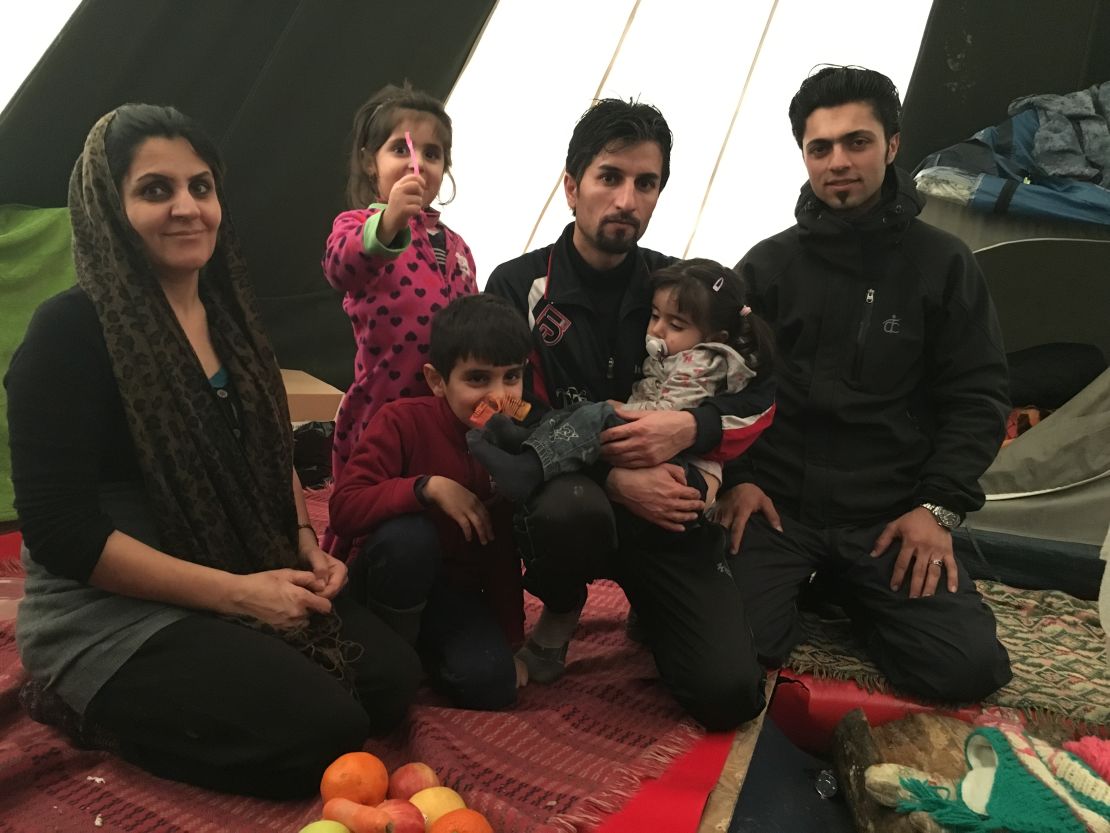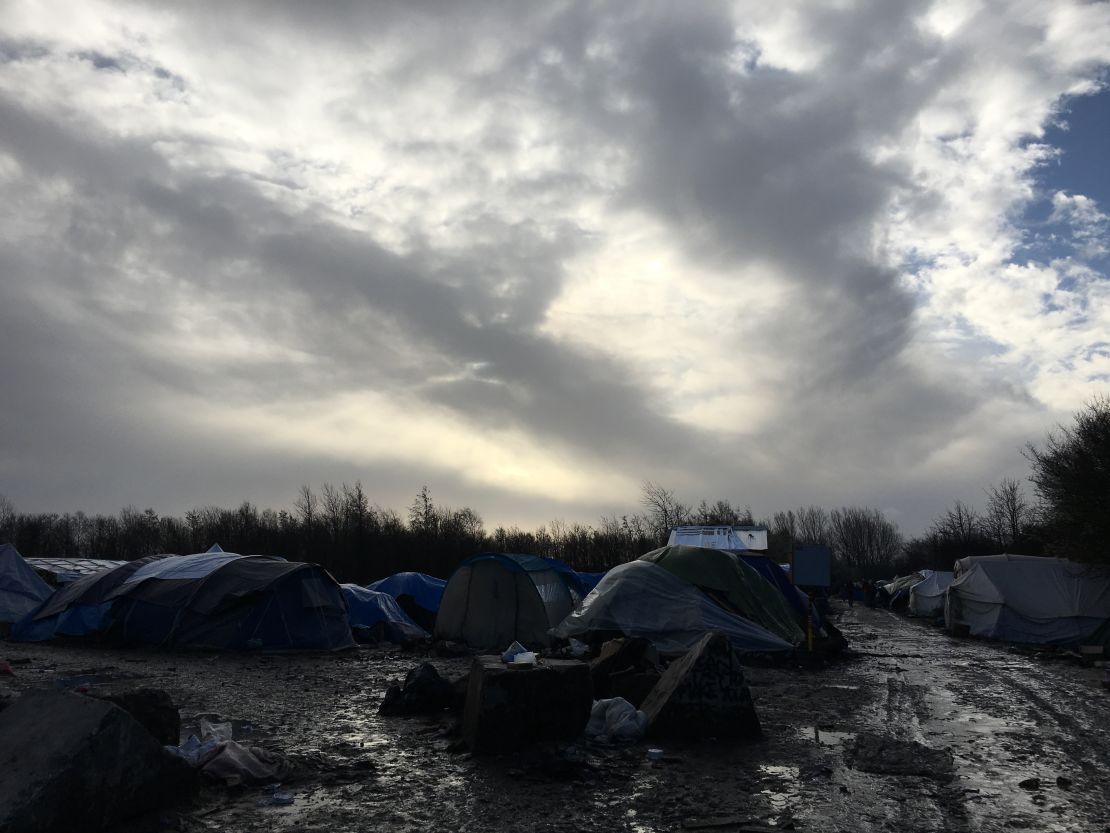It’s pouring rain on the day we arrive at the Grande-Synthe Refugee Camp on the outskirts of Dunkirk in northern France, making an already grim scenario grimmer.
At first glance it’s hard to believe this swamplike place exists between Britain and France, two of Europe’s wealthiest nations. But it does, and it’s not far from the better-known “Jungle” camp in Calais.
The people we meet during our time here are mostly Iraqi Kurds, their flag hoisted above all the tents. Doctors Without Borders says the residents are Kurds from Iraq, Syria and even Iran, and they are currently funding and building a new camp not far from this one.
The mayor’s office in Dunkirk is limited in its ability to help because of regional restrictions which do not allow for expansion or upgrade of the camp.
It’s difficult to determine how many dwell here on any given day, because the number fluctuates as people come and go. But aid workers put the figure at up to 3,000, which is a significant increase from October last year, when there were 800 people sleeping here.
Amongst them are many families.
‘Hope’ for change
Seven-year-old Mani is one of at least 250 children who live at this refugee camp. He, his parents and his sisters Mali and Manar have been here nine months.
Theirs is an existence built purely on hope at this stage, because they are in no physical state to try cross into Britain illegally in the dark of night, and the family does not have the money to pay smugglers the $10,000 price tag.
As Mani’s father, Abbas, explains, he has already paid $30,000 to bring his family from Iraqi Kurdistan to France.

Abbas made the decision to flee his home country after his parents were killed in a market bombing in Kirkuk.
Their dream is now to go to the UK, but the law requires the family to register in France. Abbas is afraid that doing that would somehow hurt his family’s chance of settling in Britain.
So right now he and his family have no choice but to wait, and in their words, “hope” for a change of policy.
The British connection
Also hoping for a change of heart is Rawand Aziz, who is actually a British citizen. He sought asylum in England 10 years ago, and for the last seven has been the proud owner of the burgundy passport – which he doesn’t hesitate to show us when we meet in his small tent.
The reality is, Rawand could leave this camp at any time and travel back to Britain perfectly legally.
But there are two very important people holding him back: his wife and his 8-month-old son, Oscar – an English name for a boy whose father hopes will go to school and grow up in England.
Rawand married his wife in Iraqi Kurdistan, which is also where his son was born, after he became a British citizen in 2009. But she and Oscar have been denied entry to the UK despite Rawand’s status. Their story is much the same as that of Abbas and his family: They must apply for asylum in France before they can make any move across the channel. And Rawand’s reluctance is for the same reason: Doing so may prevent his family from attaining asylum status in Britain down the road.
Still, Rawand remains optimistic and “very grateful” for everything the British government has done for him so far. I ask how long he will stay here, and his answer is a simple one: “However long” it takes to bring his wife and child home with him.
As we leave, we meet another family with a similar story.
Mahamed and his mother and sister have just arrived from Iraq. They are in a state of shock. Mahamed describes their first impressions: “It’s not like a prison, it’s not like a camp, it’s not like the garden, the park. It’s hell!”
He says this refugee camp is one of the worst they’ve seen along the way. But, they are here because it is a step closer to his father, who lives in Birmingham, England. Like Rawand, he is a British citizen.
Mahamed hopes his father’s British connection will allow the rest of the family safe passage. Until then they are determined to make the best of their situation.
Life must go on
Volunteers give the family a tent and help them pitch it, like they do for all new arrivals. But it’s no easy feat today as they battle strong winds, rain and a lot of mud.
Although there is no official agency or organization running the camp, a small army of volunteers make sure people here are well-fed, and have enough warm clothes, blankets and boots essential for this weather.
The refugees endure tough conditions.
Refugee camp's street signs of hope and nostalgia
Twenty-four showers for 3,000 people. And just 44 toilets.
There is sometimes hot water, but only when there is electricity in the camp. And there are concerns the harsh winter cold will bring on more cases of hypothermia, especially among the young.
French doctors from Doctors Without Borders, or Medicins Sans Frontieres, visit four times a week, and the majority of the cases they treat are linked to the weather and living conditions. Cases of respiratory tract infection and the skin disease scabies are the most common.
Angélique Muller, the MSF coordinator here, tells us scabies in particular is “quite difficult to completely eradicate because of the living conditions.”
In a cruel twist, some people we meet can actually afford to stay in hotels in the area but are unable to secure a room because they lost their passports along the way.
Fleeing for refusing to fight
At least 15 to 20 people make it into Britain illegally every night, we’re told by those living here. The empty, abandoned tents and belongings scattered around the camp support that story.
Before we leave, we meet two friends who have both tried more than a dozen times.

One of the men tells us his father is a colonel with the Peshmerga, the Kurdish force battling ISIS in Iraq. His brother is also a fighter. And he fled his hocmetown for refusing to fight: “I’m a geologist, I’m not a fighter. My father and brother say they kill me themselves if I don’t fight, so I leave.”
“We are not terrorists, we hate terrorists, and we fight against terrorists,” he explains.
Neither man wants to show his face or reveal his name in case they do end up making it across the border to Britain, but they ask us to pass on a simple message to those who will read and watch their stories: “Please tell everyone we are human, and this place is not for humans.”
Hope Street
Hope is not in short supply here. There’s even an informal street sign by that name, along with a “David Cameron Street,” and a “Queen Elizabeth II Street,” not-so-subtle nods to their Promised Land.
There may be an end in sight, a temporary one at least. Along with the medical care they continue to provide, Doctors Without Borders is building a new camp that should provide a more acceptable living environment.
Whether they will move to the new camp is up to the people here, some of whom think a move to “official” living quarters will further stall their hopes of starting a new life.










